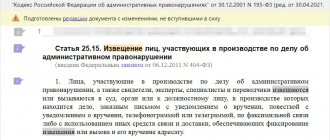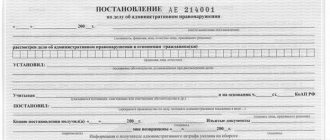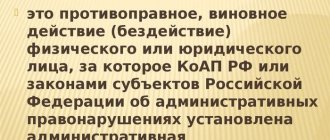New edition of Art. 29.6 Code of Administrative Offenses of the Russian Federation
1. A case of an administrative offense is considered within fifteen days from the date of receipt by the body, official authorized to consider the case, of the protocol on the administrative offense and other materials of the case or materials obtained using special technical means operating in automatic mode, having the functions of photography and filming , video recording, or means of photography, filming, and video recording.
1.1. A case of an administrative offense is considered within two months from the date the judge competent to consider the case receives the protocol on the administrative offense and other materials of the case.
2. If petitions are received from participants in the proceedings on an administrative offense or if it is necessary to further clarify the circumstances of the case, the period for consideration of the case may be extended by the judge, body, or official considering the case, but not more than by one month. The judge, body, official considering the case shall issue a reasoned ruling on the extension of the specified period.
3. Cases of administrative offenses provided for in Articles 5.1-5.25, 5.45-5.52, 5.56, 5.58, 5.69 of this Code are considered within five days from the date the judge receives the protocol on the administrative offense and other case materials. Extension of this period is not permitted.
4. The case of an administrative offense, the commission of which entails administrative arrest or administrative deportation, is considered on the day of receipt of the protocol on the administrative offense and other materials of the case, and in relation to a person subjected to administrative detention - no later than 48 hours from the moment of his detention.
5. The case of an administrative offense, for the commission of which an administrative penalty may be imposed in the form of administrative suspension of activities and a temporary ban on activities applied, must be considered no later than seven days from the date of actual termination of the activities of branches, representative offices, structural divisions of a legal entity, production sites, as well as the operation of units, objects, buildings or structures, the implementation of certain types of activities (works), and the provision of services. The period of temporary ban on activities is counted towards the period of administrative suspension of activities.
6. Lost power.
7. Cases of administrative offenses provided for in Articles 14.15.2 and 14.15.3 of this Code are considered within ten days from the date the judge receives the protocol on the administrative offense and other materials of the case. Extension of this period is not permitted.
1. A case of an administrative offense is considered within fifteen days from the date of receipt by the body, official authorized to consider the case, of the protocol on the administrative offense and other materials of the case or materials obtained using special technical means operating in automatic mode, having the functions of photography and filming , video recording, or means of photography, filming, and video recording.
(as amended by Federal Laws dated April 30, 2010 N 69-FZ, dated October 14, 2014 N 307-FZ)
1.1. A case of an administrative offense is considered within two months from the date the judge competent to consider the case receives the protocol on the administrative offense and other materials of the case.
(Part 1.1 introduced by Federal Law dated April 30, 2010 N 69-FZ)
2. If petitions are received from participants in the proceedings on an administrative offense or if it is necessary to further clarify the circumstances of the case, the period for consideration of the case may be extended by the judge, body, or official considering the case, but not more than by one month. The judge, body, official considering the case shall issue a reasoned ruling on the extension of the specified period.
3. Cases of administrative offenses provided for in Articles 5.1 - 5.25, 5.45 - 5.52, 5.56, 5.58 of this Code are considered within five days from the date the judge receives the protocol on the administrative offense and other materials of the case. Extension of this period is not permitted.
(Part three was introduced by Federal Law dated July 4, 2003 N 94-FZ, as amended by Federal Laws dated July 21, 2005 N 93-FZ, dated October 4, 2010 N 263-FZ)
4. The case of an administrative offense, the commission of which entails administrative arrest or administrative deportation, is considered on the day of receipt of the protocol on the administrative offense and other materials of the case, and in relation to a person subjected to administrative detention - no later than 48 hours from the moment of his detention.
(as amended by Federal Law dated October 25, 2004 N 126-FZ)
5. The case of an administrative offense, for the commission of which an administrative penalty may be imposed in the form of administrative suspension of activities and a temporary ban on activities applied, must be considered no later than seven days from the date of actual termination of the activities of branches, representative offices, structural divisions of a legal entity, production sites, as well as the operation of units, objects, buildings or structures, the implementation of certain types of activities (works), and the provision of services. The period of temporary ban on activities is counted towards the period of administrative suspension of activities.
(part five was introduced by Federal Law dated 05/09/2005 N 45-FZ, as amended by Federal Laws dated 07/23/2010 N 171-FZ, dated 07/18/2011 N 242-FZ)
6. Lost power. — Federal Law of July 21, 2014 N 210-FZ.
Article 29.6. Time limits for consideration of a case of an administrative offense
Decision of the Disciplinary Board of the Supreme Court of the Russian Federation dated March 12, 2019 N DK19-7 According to Part 1.1 of Article 29.6 of the Code of Administrative Offenses of the Russian Federation, a case of an administrative offense is considered within two months from the date the judge competent to consider the case receives the protocol on the administrative offense and other materials of the case, and the complaint against a resolution in a case of an administrative offense is subject to consideration within two months from the date of its receipt with all the materials of the case by the court competent to consider the complaint (Part 1.1 of Article 30.5 of the Code of Administrative Offenses of the Russian Federation).
Resolution of the Supreme Court of the Russian Federation dated July 17, 2019 N 5-AD19-40
According to paragraph 6 of the resolution of the Plenum of the Supreme Court of the Russian Federation dated March 24, 2005 N “On some issues that arise for courts when applying the Code of the Russian Federation on Administrative Offenses” in order to comply with the deadlines for consideration of cases of administrative offenses established by Article 29.6 of the Code of the Russian Federation on Administrative Offenses the judge must take measures to promptly notify the persons involved in the case about the time and place of the trial. Since this Code does not contain any restrictions associated with such a notice, depending on the specific circumstances of the case, it can be made using any available means of communication that allow you to control the receipt of information by the person to whom it is sent (subpoena, telegram, telephone message, facsimile communication, etc., via SMS message, if the person agrees to be notified in this way and when the fact of sending and delivery of the SMS notification to the addressee is recorded).
Resolution of the Supreme Court of the Russian Federation dated July 24, 2019 N 83-AD19-3
From paragraph 6 of the resolution of the Plenum of the Supreme Court of the Russian Federation dated March 24, 2005 N “On some issues that arise for courts when applying the Code of the Russian Federation on Administrative Offenses” it follows that in order to comply with the deadlines for consideration of cases established by Article 29.6 of the Code of the Russian Federation on Administrative Offenses In administrative offenses, the judge must take measures to quickly notify the persons involved in the case about the time and place of the trial. Since this Code does not contain any restrictions associated with such a notice, depending on the specific circumstances of the case, it can be made using any available means of communication that allow you to control the receipt of information by the person to whom it is sent (subpoena, telegram, telephone message, facsimile communication, etc., via SMS message, if the person agrees to be notified in this way and when the fact of sending and delivery of the SMS notification to the addressee is recorded).
Resolution of the Supreme Court of the Russian Federation dated October 2, 2019 N 18-AD19-58
From paragraph 6 of the resolution of the Plenum of the Supreme Court of the Russian Federation dated March 24, 2005 N “On some issues that arise for courts when applying the Code of the Russian Federation on Administrative Offenses” it follows that in order to comply with the deadlines for consideration of cases established by Article 29.6 of the Code of the Russian Federation on Administrative Offenses In administrative offenses, the judge must take measures to quickly notify the persons involved in the case about the time and place of the trial. Since this Code does not contain any restrictions associated with such a notice, depending on the specific circumstances of the case, it can be made using any available means of communication that allow you to control the receipt of information by the person to whom it is sent (subpoena, telegram, telephone message, facsimile communication, etc., via SMS message, if the person agrees to be notified in this way and when the fact of sending and delivery of the SMS notification to the addressee is recorded).
Resolution of the Supreme Court of the Russian Federation dated November 22, 2019 N 88-AD19-9
From paragraph 6 of the resolution of the Plenum of the Supreme Court of the Russian Federation dated March 24, 2005 N “On some issues that arise for courts when applying the Code of the Russian Federation on Administrative Offenses” it follows that in order to comply with the deadlines for consideration of cases established by Article 29.6 of the Code of the Russian Federation on Administrative Offenses In administrative offenses, the judge must take measures to quickly notify the persons involved in the case about the time and place of the trial. Since this Code does not contain any restrictions associated with such a notice, depending on the specific circumstances of the case, it can be made using any available means of communication that allow you to control the receipt of information by the person to whom it is sent (subpoena, telegram, telephone message, facsimile communication, etc., via SMS message, if the person agrees to be notified in this way and when the fact of sending and delivery of the SMS notification to the addressee is recorded).
Resolution of the Supreme Court of the Russian Federation dated November 22, 2019 N 88-AD19-8
From paragraph 6 of the resolution of the Plenum of the Supreme Court of the Russian Federation dated March 24, 2005 N “On some issues that arise for courts when applying the Code of the Russian Federation on Administrative Offenses” it follows that in order to comply with the deadlines for consideration of cases established by Article 29.6 of the Code of the Russian Federation on Administrative Offenses In administrative offenses, the judge must take measures to quickly notify the persons involved in the case about the time and place of the trial. Since this Code does not contain any restrictions associated with such a notice, depending on the specific circumstances of the case, it can be made using any available means of communication that allow you to control the receipt of information by the person to whom it is sent (subpoena, telegram, telephone message, facsimile communication, etc., via SMS message, if the person agrees to be notified in this way and when the fact of sending and delivery of the SMS notification to the addressee is recorded).
Resolution of the Supreme Court of the Russian Federation dated 04/09/2020 N 4-AD20-4
From paragraph 6 of the resolution of the Plenum of the Supreme Court of the Russian Federation dated March 24, 2005 N “On some issues that arise for courts when applying the Code of the Russian Federation on Administrative Offenses” it follows that in order to comply with the deadlines for consideration of cases established by Article 29.6 of the Code of the Russian Federation on Administrative Offenses In administrative offenses, the judge must take measures to quickly notify the persons involved in the case about the time and place of the trial. Since this Code does not contain any restrictions associated with such a notice, depending on the specific circumstances of the case, it can be made using any available means of communication that allow you to control the receipt of information by the person to whom it is sent (subpoena, telegram, telephone message, facsimile communication, etc., via SMS message, if the person agrees to be notified in this way and when the fact of sending and delivery of the SMS notification to the addressee is recorded).
Resolution of the Supreme Court of the Russian Federation dated 03/05/2019 N 66-AD19-1
In accordance with paragraph 6 of the Resolution of the Plenum of the Supreme Court of the Russian Federation dated March 24, 2005 N “On some issues that arise for courts when applying the Code of the Russian Federation on Administrative Offenses” in order to comply with the deadlines for consideration of cases established by Article 29.6 of the Code of the Russian Federation on Administrative Offenses In administrative offenses, the judge must take measures to quickly notify the persons involved in the case about the time and place of the trial. Since the Code of the Russian Federation on Administrative Offenses does not contain any restrictions associated with such a notice, depending on the specific circumstances of the case, it can be made using any available means of communication that allow you to control the receipt of information by the person to whom it is sent (subpoena, telegram , telephone message, fax, etc., via SMS message, if the person agrees to be notified in this way and when the fact of sending and delivery of the SMS notification to the addressee is recorded).
Resolution of the Supreme Court of the Russian Federation dated August 21, 2017 N 41-AD17-18
In accordance with paragraph 6 of the resolution of the Plenum of the Supreme Court of the Russian Federation dated March 24, 2005 N “On some issues that arise for courts when applying the Code of the Russian Federation on Administrative Offenses” in order to comply with the deadlines for consideration of cases established by Article 29.6 of the Code of the Russian Federation on Administrative Offenses In administrative offenses, the judge must take measures to quickly notify the persons involved in the case about the time and place of the trial. Since the Code of the Russian Federation on Administrative Offenses does not contain any restrictions associated with such a notice, depending on the specific circumstances of the case, it can be made using any available means of communication that allow you to control the receipt of information by the person to whom it is sent (subpoena, telegram , telephone message, fax, etc., via SMS message, if the person agrees to be notified in this way and when the fact of sending and delivery of the SMS notification to the addressee is recorded).
Resolution of the Supreme Court of the Russian Federation dated December 1, 2017 N 18-AD17-52
In accordance with paragraph 6 of the resolution of the Plenum of the Supreme Court of the Russian Federation dated March 24, 2005 N “On some issues that arise for courts when applying the Code of the Russian Federation on Administrative Offenses” in order to comply with the deadlines for consideration of cases established by Article 29.6 of the Code of the Russian Federation on Administrative Offenses In administrative offenses, the judge must take measures to quickly notify the persons involved in the case about the time and place of the trial. Since the Code of the Russian Federation on Administrative Offenses does not contain any restrictions associated with such a notice, depending on the specific circumstances of the case, it can be made using any available means of communication that allow you to control the receipt of information by the person to whom it is sent (subpoena, telegram , telephone message, fax, etc., via SMS message, if the person agrees to be notified in this way and when the fact of sending and delivery of the SMS notification to the addressee is recorded).
Resolution of the Supreme Court of the Russian Federation dated December 11, 2017 N 5-AD17-91
The argument of the complaint about the consideration of the case in violation of the time limit established by Part 3 of Article 29.6 of the Code of Administrative Offenses of the Russian Federation was the subject of verification as part of the consideration of the complaint against the decision of the magistrate and was rightly recognized as untenable for the reasons given in the decision of the district court judge.
Consequences of violating the deadline
The period for consideration of a case regarding any administrative offense begins to run from the day the materials and protocol on the violation are received by the authorized person. This does not include the period of administrative investigation. The compiler of the protocol on administrative violation sends it for consideration within 3 days. And for some violations - immediately (arrest, expulsion, temporary ban on activities) after drawing up.
The Code of Administrative Offenses of the Russian Federation directly states that it is impossible to extend the period for consideration of a case of violation of electoral rights. The rest of the things can be done. Both in court and in any other government body. Reasons:
- receipt of petitions from participants in the case
- the need to further clarify the circumstances of the case
But no more than 1 month.
The law does not establish liability for violation of deadlines for consideration of a case. That is, a reference to such a procedural violation is unlikely to be effective. At the same time, when appealing a decision in a case of an administrative offense, it can be used along with other arguments.
What is the penalty for delaying a traffic police fine in 2021?
The fine becomes overdue, and the debtor faces serious sanctions.
How does this happen in practice? Initially, you are given exactly 70 days to pay the fine, of which 10 days to appeal the decision and 60 days to pay the fine itself. On the 71st day from the moment you receive a copy of the decision, the fine becomes overdue.
For those who did not pay the traffic police fine on time in 2021, liability is provided for evading the execution of an administrative penalty under Part 1 of Art. 20.25 of the Code of Administrative Offences, where sanctions include:
- doubling the original (unpaid) fine - but not less than 1,000 rubles,
- compulsory work up to 50 hours,
- administrative arrest for up to 15 days.
Only the judge is authorized to make the final decision on punishment. At the same time, even if the driver faces arrest for evading a fine, traffic police officers cannot detain the car owner on the road and forcibly take him to court. This should be the case in theory. But in practice this happens, and quite often. That is, you, as an overdue fine, can be taken to the traffic police department. Or they can go directly to the magistrate’s court, where on the same day the judge will consider the case and hand down one of the punishments. If this is an arrest, then you will be taken directly from the courtroom to a special detention center.
How long can they be held accountable?
Only 3 months are allotted to attract a driver for an overdue fine - by virtue of Part 1 of Art. 4.5 Code of Administrative Offences.
The deadline is counted from the first day of non-payment, that is, on the 71st day after delivery of the IDPS decision or receipt of a “chain letter” by mail. To determine the statute of limitations, add exactly 3 months to this period.
Termination of a case under the Code of Administrative Offenses due to the expiration of the statute of limitations does not entail a refusal to recover damages
In Determination No. 8-KG20-4-K2 of April 20, 2021, the Supreme Court noted that the refusal to collect compensation for moral damage and damages from the treasury of the Russian Federation or a constituent entity of the Russian Federation without taking into account the grounds for termination of proceedings in a case of an administrative offense is unfounded.
By a resolution of the traffic police inspector dated October 25, 2021, Sergey Krylov was brought to administrative liability in the form of a fine of 500 rubles. according to Part 3 of Art. 12.14 of the Code of Administrative Offences, that is, for the fact that he did not give way to a vehicle enjoying the right of way.
On March 12, 2021, the Nekrasovsky District Court of the Yaroslavl Region canceled the decision and terminated the proceedings due to the expiration of the statute of limitations.
Since, when considering a case of an administrative offense, Sergei Krylov incurred expenses for the services of a defense lawyer in the amount of 16 thousand rubles. and postage, he filed a claim for damages. He also asked to recover compensation for moral damage in the amount of 50 thousand rubles.
The court of first instance rejected the claim. He noted that the actions of the traffic police inspector were not recognized as illegal, the guilt of the official was not established, and the proceedings in the case of an administrative offense were terminated due to the expiration of the statute of limitations for bringing to justice. The court also indicated that the plaintiff was not brought to justice in the form of administrative arrest or correctional labor, and there were no violations of personal non-property or other intangible benefits by traffic police officers. Since the appeal and cassation agreed with such conclusions, Sergei Krylov appealed to the Supreme Court.
Having studied the case materials, the Supreme Court referred to paragraph 26 of the Resolution of the Plenum of the Supreme Court of March 24, 2005 No. 5 “On some issues that arise for the courts when applying the Code of the Russian Federation on Administrative Offenses,” according to which the costs of remunerating a lawyer or other person, who participated in the proceedings as a defense attorney are not included in the costs of the administrative offense case. Since in the event of a refusal to bring a person to justice or satisfaction of his complaint against the decision to hold him accountable, this person is harmed in connection with the costs of remunerating the person who provided legal assistance, these costs on the basis of Art. 15, 1069 and 1070 of the Civil Code can be recovered in favor of this person at the expense of the corresponding treasury of the Russian Federation or the treasury of a subject of the Russian Federation.
Procedure for carrying out administrative proceedings
The case of an administrative offense is considered within fifteen days from the date the body receives the protocol on the administrative offense and other materials of the case.
If petitions are received from participants in the proceedings on an administrative offense or if additional clarification of the circumstances is necessary, the period for its consideration may be extended by the body considering the case, but not more than by one month. The body considering the case shall issue a reasoned ruling on the extension of the specified period.
The procedure for considering a case of an administrative offense:
1) it is announced who is considering the case, what case is subject to consideration, who and on the basis of what law is brought to administrative responsibility;
2) the fact of the appearance of an individual or a legal representative of an individual or a legal representative of a legal entity in respect of whom proceedings are being conducted on a case of an administrative offense, as well as other persons participating in the consideration of the case, is established;
3) the powers of legal representatives of an individual or legal entity, defender and representative are checked;
4) it is determined whether the participants in the proceedings have been notified in the prescribed manner, the reasons for the non-appearance of the participants in the proceedings are clarified, and a decision is made to consider the case in the absence of these persons or to postpone the consideration of the case;
5) persons participating in the consideration of the case are explained their rights and obligations;
6) a person against whom proceedings are being conducted for an administrative offense has the right to familiarize himself with all the materials of the case, give explanations, present evidence, file petitions and challenges, use the legal assistance of a defender, as well as other procedural rights in accordance with the Code of Administrative Offenses of the Russian Federation.
7) the case of an administrative offense is considered with the participation of the person in respect of whom the proceedings on the case of an administrative offense are being conducted. In the absence of the specified person, the case can be considered only in the cases provided for in Part 3 of Article 28.6 of this Code, or if there is information about the proper notification of the person about the place and time of consideration of the case and if the person has not received a petition to postpone the consideration of the case, or if such a petition left unsatisfied.
 An official considering a case of an administrative offense has the right to recognize the presence of the person against whom the proceedings are being conducted as mandatory during the consideration of the case.
An official considering a case of an administrative offense has the right to recognize the presence of the person against whom the proceedings are being conducted as mandatory during the consideration of the case.
9) In accordance with Art. 25.4. The Code of Administrative Offenses of the Russian Federation protects the rights and legitimate interests of a legal entity in respect of which proceedings are being carried out in a case of an administrative offense or a legal entity that is a victim, carried out by its legal representatives.
10) The legal representatives of a legal entity in accordance with the Code of Administrative Offenses of the Russian Federation are its head, as well as another person recognized in accordance with the law or constituent documents as a body of the legal entity. The powers of the legal representative of a legal entity are confirmed by documents certifying his official position.
11) The case of an administrative offense committed by a legal entity is considered with the participation of its legal representative or defense attorney. In the absence of these persons, the case can be considered only in the cases provided for in Part 3 of Article 28.6 of the Code of Administrative Offenses of the Russian Federation, or if there is evidence of proper notification of persons about the place and time of the consideration of the case and if they have not received a petition to postpone the consideration of the case or if such a petition has been abandoned without satisfaction.
12) When considering a case of an administrative offense committed by a legal entity, the official in charge of the case of the administrative offense has the right to recognize the presence of a legal representative of the legal entity as mandatory.
13) In accordance with Art. 25.5. To provide legal assistance to a person against whom proceedings are being conducted for an administrative offense, a defense attorney may participate in the proceedings, and to provide legal assistance to a victim, a representative.
14) A lawyer or other person is allowed to participate in proceedings regarding an administrative offense as a defense attorney or representative.
15) The powers of a lawyer are certified by a warrant issued by the relevant legal entity. The powers of another person providing legal assistance are certified by a power of attorney issued in accordance with the law.
16) The defense attorney and the representative are allowed to participate in the proceedings on the case of an administrative offense from the moment the case of the administrative offense is initiated.
17) The defense lawyer and representative admitted to participate in the proceedings on an administrative offense have the right to familiarize themselves with all the materials of the case, present evidence, file petitions and challenges, participate in the consideration of the case, appeal the application of measures to ensure the proceedings in the case, the decision on the case, use other procedural rights in accordance with the Code of Administrative Offenses of the Russian Federation.
Based on the results of consideration of a case of an administrative offense, a decision may be made:
1) on imposing an administrative penalty;
2) on termination of proceedings in the case of an administrative offense.
A decision to terminate proceedings in a case of an administrative offense is made in the following cases:
1) the presence of at least one of the circumstances excluding proceedings in the case provided for in Article 24.5 of the Code of Administrative Offenses of the Russian Federation;
2) announcement of an oral comment in accordance with Article 2.9 of the Code of Administrative Offenses of the Russian Federation;
3) termination of the proceedings and transfer of the case materials to the prosecutor, the preliminary investigation body or the inquiry body if the actions (inaction) contain signs of a crime.
The resolution in a case of an administrative offense must indicate:
1) position, surname, name, patronymic of the judge, official, name and composition of the collegial body that made the decision;
2) date and place of consideration of the case;
3) information about the person in respect of whom the case was considered;
4) circumstances established during the consideration of the case;
5) an article of this Code or a law of a constituent entity of the Russian Federation providing for administrative liability for committing an administrative offense, or grounds for termination of proceedings;
6) a reasoned decision on the case;
7) the period and procedure for appealing the decision.
Announcement of a decision in a case of an administrative offense
1. A decision in a case of an administrative offense is announced immediately upon completion of the consideration of the case.
2. A copy of the decision in a case of an administrative offense is handed over against receipt to the individual or the legal representative of the individual or the legal representative of the legal entity in respect of whom it was made, as well as to the victim at his request, or is sent to the indicated persons within three days from the date of issuance of the said decision .
Attention:
The Code of the Russian Federation on Administrative Offenses provides for the following:
1) If an administrative fine is not paid within a month, the relevant materials are sent to the bailiff to collect the amount of the administrative fine (in accordance with Article 32.2 of the Code of Administrative Offenses of the Russian Federation).
2) In addition, a decision is made to bring a person who has not paid an administrative fine within the established time frame to administrative liability in accordance with Part 1 of Art. 20.25 of the Code of Administrative Offenses of the Russian Federation - imposition of a fine in the amount of twice the amount of the unpaid fine or administrative arrest for up to fifteen days.





